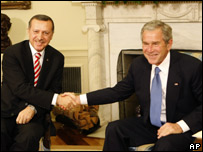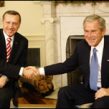
MAJORITY OF TURKISH MEDIA CLAIMS BUSH GAVE TURKEY GREEN LIGHT FOR MILITARY OPERATION
Publication: Eurasia Daily Monitor Volume: 4 Issue: 206
By:

The majority of the Turkish media believe that U.S. President George W. Bush effectively gave Turkish Prime Minister Recep Tayyip Erdoğan a green light for a military operation against elements of the Kurdistan Workers’ Party (PKK) in northern Iraq during their November 5 meeting.
Although most of the international press saw Bush’s promises of closer military and intelligence cooperation as designed to forestall a Turkish military incursion into northern Iraq, most of the Turkish media regarded them as removing obstacles to Turkish military action. The impression was reinforced by Erdoğan’s statements after his press conference with Bush, particularly in conversations with Turkish journalists at Washington’s Ritz Carlton Hotel.
“Praise be to God. We got what we came for,” Erdoğan was quoted as saying (NTV, November 6), which most Turkish journalists interpreted as meaning a commitment from the Bush administration to not block Turkish military action against the PKK in northern Iraq (Hurriyet, Sabah, Vatan, November 6).
During their November 5 meeting¸ Bush and Erdoğan agreed to establish a tripartite mechanism that would include serving members of both the Turkish and U.S. militaries. However, in an address he gave to the Center for Strategic and International Studies after meeting with Bush, Erdoğan was quoted by the Turkish semi-official Anatolian Agency as saying that such mechanisms could not achieve anything in the fight against terrorism (Anatolian Agency, November 6). Several Turkish newspapers also quoted Erdoğan as telling a question-and-answer session at the National Press Club that his government would use the authority recently granted it by the Turkish parliament to launch a military operation (Hurriyet, Vatan, Sabah, Milliyet, November 6).
“Nobody told us not to launch a military operation,” the NTV news channel quoted Erdoğan as saying after his meeting with Bush. “They just told us we were right” (NTV, November 6).
The Zaman daily newspaper, which is run by supporters of the Islamist preacher Fetullah Gulen, who is currently in exile in the United States, expressed its disappointment that Washington had offered Turkey promises rather than concrete action (Zaman, November 6). In contrast, the ultranationalist Yeni Cag, which is currently running a series of articles entitled “The Harlot America: the enemy that looks like a friend,” bitterly criticized the Bush administration for failing to take concrete action against the PKK and described Erdogan’s meeting with Bush as “the collapse of foreign policy” (Yeni Cag, November 6). Devlet Bahceli, the leader of the ultranationalist Nationalist Action Party (MHP), which is currently the third-largest party in the Turkish parliament, characterized the outcome of the talks between Erdoğan and Bush as “a mountain giving birth to a mouse” (CNNTurk, November 6).
Nevertheless, most other newspapers were adamant that Bush had tacitly approved military action. The nationalist Hurriyet, which is Turkey’s biggest selling daily, the liberal Radikal, and the center-right Milliyet all topped their November 6 front pages with banner headlines declaring that the United States had given Turkey a “green light” for military action against the PKK in northern Iraq. In Radikal, Murat Yetkin, one of Turkey’s most respected columnists, suggested that Turkey could now stage a series of small-scale operations against the PKK based on intelligence provided by the United States (Radikal, November 6). In his November 6 column in Milliyet, Derya Sazak predicted that the intelligence would be used for a military incursion. “The countdown to a cross-border operation has now started,” he wrote.
The Independent Communications Network (BIA), a pro-Kurdish news service that is independent of the PKK, was a little more cautious, describing the outcome of the meeting between Bush and Erdoğan as giving Turkey an “amber” rather than a “green” light for a military incursion into northern Iraq (BIA, November 6).
But, even if they were in a minority, some military experts remained skeptical about a cross-border operation. “I said before the meeting between Erdoğan and Bush that there would not be a cross-border operation, and nothing I have seen since has changed my mind,” retired Major General Armağan Kuloğlu told the NTV television news channel after Bush and Erdoğan had held their joint press conference (NTV, November 5).
There is also as yet little to suggest that the Turkish military is scaling back its operations against PKK militants inside the country or its preparations for a cross-border incursion into northern Iraq. On November 5, a Turkish soldier was injured by a PKK mine, while there was still reported to be considerable military movement on both sides of Turkey’s border with Iraq. Meanwhile, Turkish security forces continue their preparations to stage an incursion, and the Iraqi Kurdish military got ready to confront them (Milliyet, Sabah, Radikal, November 6).




